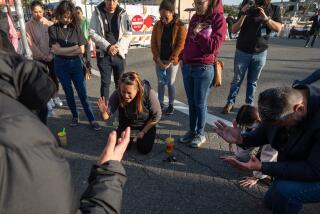Boston bombings: Muslims fear another ‘hysteria’
We will know soon enough who unleashed Monday’s grotesque violence on Boston. But it is fair to say that many Muslims who heard that explosions had marred the end of the Boston Marathon had a simple, poignant thought: Please don’t let it be a Muslim.
“Was this thought crossing your mind today?” asked the Facebook page of the Muslim Public Affairs Council in Los Angeles, which featured this Washington Post blog post on the subject. “Seems like it was for many Muslims.”
For Muslims who lived through the hysteria that followed the bombing of the Alfred P. Murrah Federal Building in Oklahoma City in 1995, and the ugliness of the backlash against Muslims after the 9/11 attacks, such a response is understandable. “It’s bad enough we have to witness the tragedy over and over again on CNN, and hear stories of an 8-year-old boy dying,” said MPAC president Salam Al-Marayati. “And then to add to that the idea your religion is going to be dragged through the mud, that’s another layer of concern and anxiety.” Not long after the Boston attack, his group issued a press release that was mostly ignored: “MPAC condemns heinous terrorist attack. Our thoughts and prayers are with all those in Boston.”
FULL COVERAGE: Explosions at Boston Marathon
It was important to make the statement, Al-Marayati said, because Muslim groups are often unfairly criticized for failing to raise their voices against violence. But even when they raise their voices, he said, they have trouble being heard. “People say, ‘We love your message. How come we don’t hear enough of it?’” said Al-Marayati. “Or we still hear, ‘Where is the moderate voice.’ We are always struggling to get our message out in a newsworthy fashion. People do pay attention more to extremists because they are the ones who can make news.” Al-Marayati, who is a member of the Faith-Based Advisory Committee of the president’s Homeland Security Advisory Council, said he thinks there are fewer reflexive attempts to blame Muslims for apparent acts of terror than there used to be. But the attitude lingers.
“The New York Post said it’s a Saudi national, Pamela Geller said ‘Jihad in Boston,’ “ Al-Marayati said. (The New York Post reported that one of victims injured in the blast was a 20-year-old Saudi national who was being detained by police. Monday night, CBS News correspondent John Miller, a former FBI public affairs director, said that a Saudi man running from the scene — as were most other people — had been tackled by a bystander and turned over to police. He had not been arrested, was cooperating with authorities and denied any involvement in the blasts, Miller said. Geller is an Islamophobic blogger who has made a name for herself ranting about Muslims.)
“On one hand, some want to jump on the bashing of Muslims and Islam because those are coded words for saying ‘Islam is the problem,’”Al-Marayati said. “On the other hand, Al Qaeda is a real threat. But terrorism has no religion.”
ALSO:
Audrie Pott case: Investigators ‘still trying to piece it together’
Teachers dislike breakfast in the classroom program, survey finds
Boston bombing: Silent memorial, extra security at Dodger Stadium
Twitter: @robinabcarian
Email: [email protected]
More to Read
Sign up for Essential California
The most important California stories and recommendations in your inbox every morning.
You may occasionally receive promotional content from the Los Angeles Times.











